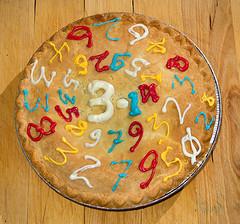
Play and Mathematics
An Equation that Works
March 14, 2014
In honor of “Pi Day,” a day to celebrate math concepts, named for the mathematical symbol pi (3.14 . . .), NIEER presents a guest blog post on the importance of play-based learning in mathematics from Deborah Stipek, Stanford University Professor. For a full review of our forum on play-based learning, please click here.
Often, the resistance to teaching by advocates of play is based on an image of “instruction” as drill-and-kill activities which, in addition to being boring, do not help children develop deep understanding of discipline-based knowledge and skills (although they may produce better performance on traditional tests of a limited set of skills). Because this image comes to many preschool teachers’ minds when you mention teaching, they resist. But basic skill drills are not the only alternative to play. Teachers who resist instruction might change their minds if they had an image of the teaching strategies that most experts advocate.

Consider math, for example. The field of early math teaching has evolved to provide many examples of research-based instruction that should please people who advocate play for young children. Most experts now endorse purposeful instruction that supports the development of deep mathematical understandings and that children enjoy—what I call “playful learning.”
But effective (and playful) math, as well as effective literacy teaching, requires considerable skill – more than is needed to hand out ditto sheets. Teachers need to understand math themselves, and they need to know how to assess children’s understandings in different domains of math, and determine appropriate activities and scaffolding to bring them to the next level. The same is true for literacy. Even the most structured curriculum depends on teachers’ judgment and skill for effective implementation. And while teachers engage with children in math or literacy learning, they need to provide an emotionally secure social context and support the development of self-regulation and social skills.
Most preschool teachers in the US do not get an opportunity to develop these skills. Even teachers who have bachelor’s degrees—the current gold standard—do not necessarily have any relevant training in pedagogy. The focus in preparing preschool teachers has traditionally been on child development, which to be sure is relevant, but does not prepare a new teacher to help children develop an understanding of the many facets of early mathematics or develop early literacy skills. Until we invest in pedagogical training that prepares preschool teachers to provide children with playful, but also purposeful and effective, learning opportunities, the debate about play will continue.
About NIEER
The National Institute for Early Education Research (NIEER) at the Graduate School of Education, Rutgers University, New Brunswick, NJ, conducts and disseminates independent research and analysis to inform early childhood education policy.
